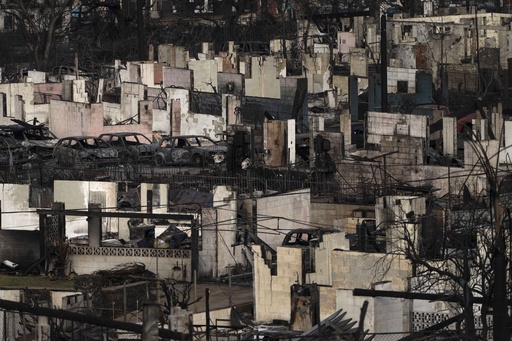
NASHVILLE, Tenn. — A significant number of American farmers, small business owners, and survivors of wildfires are facing hardships as Congress struggles to come to an agreement on a new spending bill. This impasse follows President-elect Donald Trump’s unexpected rejection of a bipartisan proposal that aimed to allocate over $100 billion in disaster relief funding.
In Hawaii, a mayor is intently monitoring the situation due to the potential for $1.6 billion in funding that could greatly impact ongoing recovery efforts from the devastating Maui fire of 2023, which was the deadliest wildfire in the U.S. in over a century. Maui Mayor Richard Bissen expressed that funding plays a crucial role in providing hope and stability for those affected. “Long delays in funding lead to uncertainty,” he stated, emphasizing the psychological toll on residents facing tough decisions about their futures following the tragedy.
The catastrophic fire, which occurred in August 2023, resulted in at least 102 fatalities and destroyed thousands of homes, leaving an estimated $5.5 billion in damages. While temporary relief has been provided through the Federal Emergency Management Agency, Bissen highlighted that long-term disaster recovery funding is essential for housing assistance and infrastructure rebuilding efforts.
Additionally, funding is in high demand after Hurricanes Helene and Milton devastated the southeastern U.S. this fall. Helene, in particular, was the deadliest storm to impact the mainland U.S. since Hurricane Katrina in 2005, claiming at least 221 lives. The storm caused extensive flooding and destruction, especially in North Carolina, where damages are estimated at around $60 billion. Jessie Dean, founder and CEO of Asheville Tea Co., shared her concerns about the proposed funding bill, noting that her business suffered extensive losses due to flooding from Helene. She relies on funding to support her business, which employs 11 people and collaborates with local farmers for ingredients.
Amid continuing struggles, a newly proposed version of the spending bill that would support government operations and revive disaster aid, backed by Trump, was turned down by the House of Representatives. The future steps regarding this funding remain uncertain. Mayor Bissen urged lawmakers to prioritize the needs of disaster survivors, stressing that the situation should be recognized as a pressing matter. He pointed out that it has already been 16 months since the Maui fire without adequate federal assistance being provided.
In Asheville, Dean noted that her business has received support from customers and local nonprofits, but more assistance is imperative. Despite applying for disaster relief loans from the U.S. Small Business Administration, she and other local business owners have not received any aid. She lamented daily conversations with peers who are caught in tough decisions about the viability of their businesses.
Farmers are similarly impacted, as previous iterations of the bill included about $21 billion in aid for them. Georgia pecan farmer Scott Hudson emphasized the struggle many farmers face due to the lack of federal support, especially since Hurricane Helene’s impact led to the loss of thousands of trees and drastic reductions in crop yields. “Without federal disaster money, farmers like me can’t sustain operations,” he declared, urging a bipartisan approach to addressing the needs of the farming industry.
In Fairview, North Carolina, Thomas Ellzey, a retired engineer, has been living in a mud-laden house for three months, awaiting necessary disaster aid. Despite pre-qualifying for a low-interest loan from the SBA, which is vital for rebuilding, he has been informed that funds are currently unavailable pending Congressional action. Ellzey detailed how unforeseen challenges such as hurricanes have upended his careful financial planning for retirement.
The earlier version of the spending bill included provisions for low-interest loans aimed at businesses and homeowners rebuilding after disasters and also allocated funds for infrastructure repair and community recovery via grants from the Department of Housing and Urban Development. The grants are particularly critical for homeowners lacking sufficient insurance coverage.
While Hurricanes Helene and Milton may be recent natural disasters, the proposed funding also covers relief for various disasters experienced over the years, including droughts and wildfires. Stan Gimont, a senior adviser for community recovery at Hagerty Consulting, highlighted that the nation continues to pay for past disasters while simultaneously preparing for future ones, citing the ongoing cleanup efforts following the Maui fire as an urgent example. “The bills for such events will continue to arise long after the initial incident,” Gimont remarked, underlining the importance of sustained funding for recovery efforts.
